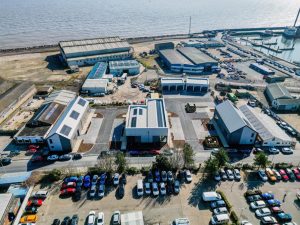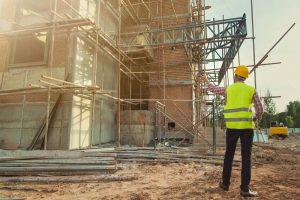As the UK grapples to meet the current challenges posed by issues including Covid-19, climate change, population growth and the requirement for rapidly advancing technology, there is increasing pressure to ensure that the infrastructure necessary for future growth is in place. The government has huge aspirations to ‘build back better’ and to ‘level up’ across the country, and local councils have a significant role in the provision of this infrastructure, using their devolved powers to stimulate growth in their local economies through strategic investment.
Accessing the funding required to support growth is crucial and there are many routes local authorities can take to support their projects, all of which have specific priorities and expect different outcomes. In recent months numerous new funds have been set up specifically to support economic growth post-covid, drawing investment from the EU and central government to kickstart projects.
In this blog, Procure Partnership Key Account Manager Faye Dolan, explores some of the funding streams currently available and discusses the ways in which the Procure Partnerships team can support public sector customers achieve their wider project objectives through strategic procurement.
Funding Stream Requirements
One question we get asked many times from prospective framework users, is ‘Is the Procure Partnerships Framework compliant with our funding stream?’ Different funding streams often focus on addressing different economic and social issues and often demand specific project outcomes.
• LEP Funding
Since 2010, local government has taken a bigger role in determining local priorities and making strategic decisions about local investment. Devolution deals have enabled localities to develop long term plans and strengthen local leadership through directly elected city-region mayors, Combined Authorities and Local Enterprise Partnerships (LEPs).
LEPs are locally owned partnerships between local authorities and businesses and they play a critical role in driving economic growth and increasing confidence in investment from the private sector. Since 2010, LEPs have been able to access the £1.4bn Regional Growth Funds which provide focused investment for projects that offer the potential for private sector-led economic growth and sustainable employment. The objective of this funding is to facilitate the sharing of knowledge and expertise between the private sector, local authorities and their local communities, which will ultimately create a better environment for business and allow local people to benefit from the increased opportunities that growth brings.
• ERDF Funding
LEPs and Combined Authorities also have strategies for the use of European Funds. The European Regional Development Fund, which is one channel of the European Structural and Investment Fund (ESIF), was created to help strengthen economic and social cohesion in the EU and reduce the imbalances between regions. The ERDF focuses its investments on key priority areas:
o Innovation and research
o The digital agenda
o Support for small and medium-sized enterprises (SMEs)
o The low-carbon economy
The ERDF categorises regions to allocate resources; in more developed regions, at least 80% of funds must focus on at least two of above priorities, in ‘transition regions’ the focus is at 60% and in less developed regions this reduces again to 50%.
Furthermore, between 12% and 20% of ERDF resources must be channelled specifically towards low-carbon economy projects.
• Getting Building Fund
In August 2020, the government announced a £900 million Getting Building Fund. The fund is designed to deliver jobs, skills and infrastructure across the country and to target the areas facing the biggest economic challenges as a result of the Covid-19 pandemic. The fund is expected to help push through the delivery of ‘shovel-ready’ infrastructure projects which will boost local economic growth.
The funding is delivered via the regional LEPs and Combined Authorities and will align with existing key local priorities. Key outputs for the funding must include:
o The creation of new jobs and the safeguarding of existing jobs.
o Improved public realm and green spaces and the creation of new cycle / walkway lanes.
o The unlocking and utilisation of existing commercial space to support business growth and expansion.
o Improved digital connectivity to encourage economic performance in more isolated areas.
• Building Better Opportunities – Lottery Funding
The National Lottery Community Fund matches funds from the European Social Fund for projects across England that tackle poverty, promote social inclusion and drive local jobs and growth.
Building Better Opportunities funding is delivered across the LEPs in accordance their local priorities. The fund supports a variety of projects which help improve social outcomes for the most disadvantaged and help them move closer to employment.
• Sport England Funding
Sport England invest more than £250 million of National Lottery and public money each year to support projects which encourage people to play sport and take part in physical activity. The Sport England Strategic Facilities Fund works with local authorities to ensure the necessary facilities are available to increase participation in unrepresented groups. Grants of between £500,000 and £2 million can be considered for a standalone project or as a contribution to a strategic plan that includes more than one project.
• Heritage Lottery Funding
The National Lottery Heritage Fund covers the full breadth of natural and cultural heritage across the UK. Heritage grants are awarded to a variety of organisations who manage and protect venues such as museums, libraries, historic buildings and monuments, and arts and cultural spaces, with £8 billion distributed to more than 44,000 projects since 1994. The breath of projects supported by the Heritage Lotter Fund is wide and new streams are often released to deal with specific circumstances, such as the current Green Recovery Challenge Fund to help kickstart the nations green recovery from the Covid-19 pandemic.
• The Future High Streets Fund
The aim of the £1 billion Future High Streets Fund is too renew and reshape town centres and high streets in a way that drives growth and ensures future sustainability. The fund will support applicants to transform town centres and provide solutions to local challenges, such as by improving transport and access into town centres, converting empty retail units into new homes and workplaces, and improving vital infrastructure. High streets play a crucial role in the growth of the economy and the Covid-19 pandemic shone a spotlight on the importance of making public spaces more accessible to pedestrians.
How does strategic procurement impact project outcomes?
Procuring a project through the Procure Partnerships Framework allows the project team to focus on critical outcomes early on, in a coordinated and structured way. For example, if a project must be delivered within a certain timescale or has specific social value objectives to achieve in order to meet a funding requirement, the Framework team can ensure this is prioritised during the early planning stages.
Many of the funding streams available to local authorities require evidence that the project will benefit the wider economy. The more far reaching the impact, the better the chance of securing the funding. Impacts could include the provision of employment and training opportunities, the support of local community projects, or leveraging the maximum value from the project budget to enhance the facilities available to local people. The collective power of our industry leading Contractor Partners means together we can maximise the social impact we can achieve.
Early engagement with contractors and the wider project team to access advice on programme management or different ways to maximise the budget is extremely useful in helping public sector organisations get the most from their money. The structure of the framework provides a forum for the Contractor Partners to collaborate in a way which is limited by a traditional tender process. The customer can access the collective best practice in areas such as carbon efficiency, innovative digital technologies and automation, value engineering and modern methods of construction to benefit their project.
Working closely with public sector organisations from the very initial stages of the project helps to simplify the procurement process and provides the reassurance that the procurement route is fully compliant not only with OJEU legislation, but also with the specific requirements of their funding stream.
Public Sector Decarbonisation Scheme
“In October 2020, the Government launched the Public Sector Decarbonisation Scheme, a grant scheme that will be delivered by Salix Finance. The grant scheme will allocate £1billion of grant funding to encourage public sector organisations to invest in ‘Green’ technologies which aligns with the Government’s Net Zero and Clean Growth goals.The grant scheme will be available for capital energy efficiency and heat decarbonisation projects on non-domestic buildings within the public sector, including central government department and eligible bodies in England.
In addition to the decarbonisation schemes, the grant scheme will be supported by the Public Sector Low Carbon Skills Fund. This is a fund which is available to organisations who need support to develop their applications or deliver projects which are secured from grant funding. This fund means that no eligible body is prevented from putting forward a project through lack of project development resources.
The project timescales for this fund are ambitious with applications needing to be made by Monday 11 January 2021 and all work complete by 30 September 2021. The aim of this fund is to stimulate the economy and help to develop the green economy as we recover from the Covid pandemic. The eligible bodies include central government and arm’s length bodies, emergency services, institutions of further and higher education, local authorities, maintain schools, multi academy trusts and free schools, nursery schools; maintained by the Local Authority, NHS Trusts and Foundations and non-departmental public bodies”. – Chris Holder at Baily Garner
Through our Professional Services agreement we can support you to carry out feasibility, contact to learn more Click Here



